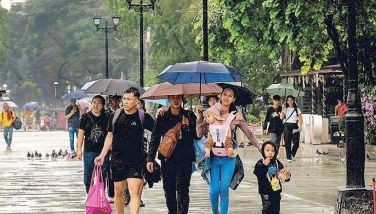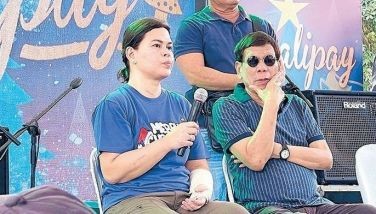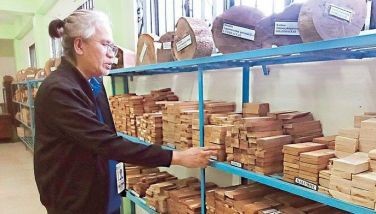SC asked to dismiss House petition vs ‘people’s court’
December 8, 2005 | 12:00am
The conveners of the Citizens’ Congress for Truth and Accountability asked the Supreme Court yesterday to dismiss the petition filed by some congressmen seeking a temporary restraining order to stop the "people’s court" proceedings against President Arroyo.
The congressmen were represented by Maguindanao Rep. Simeon Datumanong, while the conveners were led by former Vice President Teofisto Guingona.
In a 42-page comment filed through the conveners’ lawyer, Santiago Kapunan, Guingona said the congressmen’s petition does not deserve serious consideration by the Supreme Court because "the petitioners do not pretend nor claim to have any private interest that needs to be protected on the basis of any legal right."
He said the petition is nothing more than an attempt to close one of the remaining venues for people’s participation in governance, particularly on the issue of accountability of government officials led, in this case, by Mrs. Arroyo.
Guingona said the claim by the congressmen that the conveners are "usurping legislative and executive powers is totally baseless in fact and in law."
"Articles 15 and 16 of the Constitution vest in peoples’ organizations the right to participate in social, economic and political decision-making through consultative mechanisms of their own initiative. The people and their organizations have the right to participate in all levels of social, political and economic decision-making," he said.
Guingona said the conveners of the "people’s court" cannot be prohibited from exercising their constitutionally protected right to freedom of speech, expression and assembly.
"By asking the court to suppress the proceedings of the Citizens’ Congress for Truth and Accountability on the basis of the content of its discussion, the petitioners are asking the Supreme Court to exercise prior restraint," he said.
Guingona said this prior restraint constitutes censorship. "In any event, where the prior restraint is sought to be imposed upon speech or expressive conduct based on content, the prior restraint may be allowed only if there is a clear and present danger of the evil that Congress seeks to prevent," he said.
Guingona said it is wrong for the pro-administration congressmen and the Arroyo administration to contend that the people’s court constitutes a clear and present danger to the government.
He said the High Tribunal previously allowed the exercise of constitutional rights parallel to official actions, such as the holding of exit polls by private entities, without usurping the function of the Commission on Elections (Comelec).
Guingona cited the case of ABS-CBN Broadcasting Corp. versus the Comelec, in which the Supreme Court ruled that media, "and therefore private citizens, may fully exercise their right to complement government efforts on matters of basic public concern, such as elections, through activities conducted simultaneously with official performance and that these are not to be interpreted as undermining the official government activity."
Guingona said it is the first time in the history of the country that the Supreme Court has been called upon to prevent citizens and their organizations from engaging in activities where they can "ascertain for themselves whether or not the incumbent president, together with other officials of the Philippine government, have performed acts inimical to the highest interests of the country."
The congressmen were represented by Maguindanao Rep. Simeon Datumanong, while the conveners were led by former Vice President Teofisto Guingona.
In a 42-page comment filed through the conveners’ lawyer, Santiago Kapunan, Guingona said the congressmen’s petition does not deserve serious consideration by the Supreme Court because "the petitioners do not pretend nor claim to have any private interest that needs to be protected on the basis of any legal right."
He said the petition is nothing more than an attempt to close one of the remaining venues for people’s participation in governance, particularly on the issue of accountability of government officials led, in this case, by Mrs. Arroyo.
Guingona said the claim by the congressmen that the conveners are "usurping legislative and executive powers is totally baseless in fact and in law."
"Articles 15 and 16 of the Constitution vest in peoples’ organizations the right to participate in social, economic and political decision-making through consultative mechanisms of their own initiative. The people and their organizations have the right to participate in all levels of social, political and economic decision-making," he said.
Guingona said the conveners of the "people’s court" cannot be prohibited from exercising their constitutionally protected right to freedom of speech, expression and assembly.
"By asking the court to suppress the proceedings of the Citizens’ Congress for Truth and Accountability on the basis of the content of its discussion, the petitioners are asking the Supreme Court to exercise prior restraint," he said.
Guingona said this prior restraint constitutes censorship. "In any event, where the prior restraint is sought to be imposed upon speech or expressive conduct based on content, the prior restraint may be allowed only if there is a clear and present danger of the evil that Congress seeks to prevent," he said.
Guingona said it is wrong for the pro-administration congressmen and the Arroyo administration to contend that the people’s court constitutes a clear and present danger to the government.
He said the High Tribunal previously allowed the exercise of constitutional rights parallel to official actions, such as the holding of exit polls by private entities, without usurping the function of the Commission on Elections (Comelec).
Guingona cited the case of ABS-CBN Broadcasting Corp. versus the Comelec, in which the Supreme Court ruled that media, "and therefore private citizens, may fully exercise their right to complement government efforts on matters of basic public concern, such as elections, through activities conducted simultaneously with official performance and that these are not to be interpreted as undermining the official government activity."
Guingona said it is the first time in the history of the country that the Supreme Court has been called upon to prevent citizens and their organizations from engaging in activities where they can "ascertain for themselves whether or not the incumbent president, together with other officials of the Philippine government, have performed acts inimical to the highest interests of the country."
BrandSpace Articles
<
>
- Latest
- Trending
Trending
Latest
Trending
Latest
Recommended






























